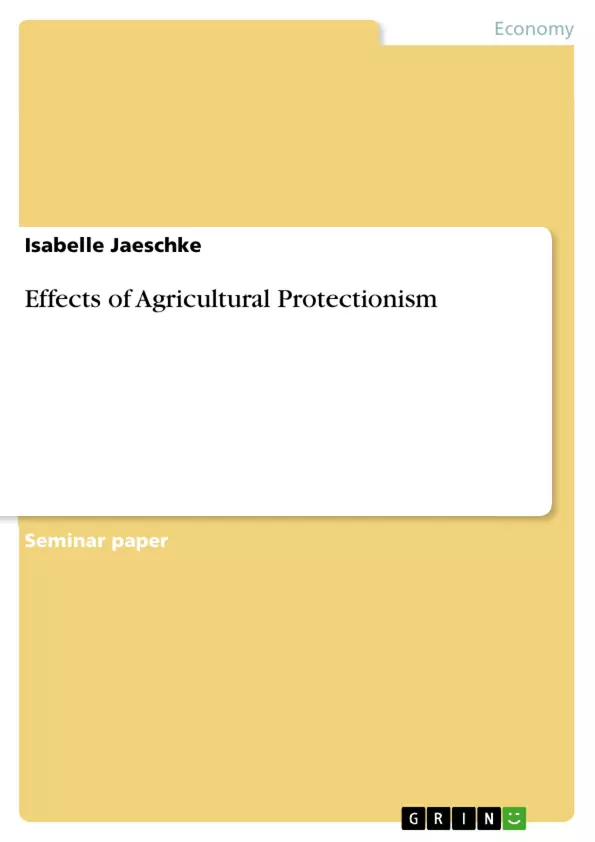This thesis focuses on protectionism in the agribusiness sector of the European Union, its motivations
and its positive and negative effects and its global correlations.
As we are living in a globalized world, economical decisions lead to complex effects all over the world. Often there are trade-offs. People suffering from malnutrition and hunger remains a big challenge. Worldwide the percentage of people living in absolute poverty has decreased continuously. Still action is required, especially regarding an increasing unequal distribution of resources and growth in the world due to globalization and trade. Disadvantages and effects caused by global trade, trade agreements and its negative effects caused by an unequal distribution of resources and growth in the world. Mainly caused by different circumstances and soil factors (different climate, soil, drought) the agribusiness sector is affected by.
Basic conditions differ from country to country, this in turn means different basic possibilities for farmers and production of nutrition. As there is manifested a "Right of food", the agribusiness sector plays a key role as it is the basis for ensuring the nutrition of the world population. Trade agreements developed over years with different intentions, today this brings huge disadvantages to still developing countries which should not lose sight of.
Inhaltsverzeichnis (Table of Contents)
- Introduction
- Problem Statement
- Objectives
- Defining the Agricultural Sector
- Economic Models
- Ricardian Model of Comparative Costs Advantages
- Liberalization of the Agricultural Market
- Model of Food Sovereignty
- Model of Protectionism
- Agricultural Protectionism in the European Union and Germany
- Origin of the special position of Agriculture in the EU and Germany
- Common Agricultural Policy of the EU
- Trade vs. Hunger Trade-off
- Result
- Conclusion
Zielsetzung und Themenschwerpunkte (Objectives and Key Themes)
This thesis examines agricultural protectionism in the European Union, specifically focusing on its motivations, positive and negative effects, and global correlations. The work aims to analyze the origins of agricultural protectionism in Germany and the EU, explore the historical context, and understand the current state of affairs. It also aims to evaluate the impact of the Common Agricultural Policy on global food security and the potential trade-offs between surplus production and the fight against hunger.
- The historical context of agricultural protectionism in the EU and Germany
- The motivations behind agricultural protectionism, including economic and social factors
- The impact of the Common Agricultural Policy on global food security
- The trade-off between surplus production and the fight against hunger
- The global implications of agricultural protectionism
Zusammenfassung der Kapitel (Chapter Summaries)
- Introduction: This chapter introduces the topic of agricultural protectionism and its relevance in a globalized world. It highlights the need for addressing food security while acknowledging the complexities of trade and the unequal distribution of resources.
- Defining the Agricultural Sector: This chapter defines the agricultural sector and its importance as the basis for food security. It addresses the challenges faced by the sector due to factors like climate change, soil conditions, and trade agreements.
- Economic Models: This chapter explores different economic models related to international trade and their applications in agriculture. It delves into models like the Ricardian model of comparative cost advantage, models of market liberalization and food sovereignty, and the model of protectionism.
- Agricultural Protectionism in the European Union and Germany: This chapter analyzes the historical and political context of agricultural protectionism in the EU and Germany. It discusses the origins of the special position of agriculture in these countries and the development of the Common Agricultural Policy (CAP).
- Trade vs. Hunger Trade-off: This chapter examines the complex trade-offs between agricultural protectionism and global food security. It explores the potential negative effects of protectionist policies on developing countries and discusses the potential for conflict between surplus production and the fight against hunger.
Schlüsselwörter (Keywords)
Agricultural protectionism, Common Agricultural Policy (CAP), food security, trade liberalization, global trade, comparative advantage, developing countries, surplus production, hunger, trade-offs, European Union, Germany.
Frequently Asked Questions
What is agricultural protectionism in the EU?
It refers to the economic policies and motivations behind the European Union's efforts to protect its domestic agribusiness sector, primarily through the Common Agricultural Policy (CAP).
What is the "Trade vs. Hunger" trade-off?
This concept examines the conflict between maintaining agricultural surpluses in developed nations and the impact these policies have on global food security and developing countries.
Which economic models are analyzed in this thesis?
The thesis explores the Ricardian Model of Comparative Costs Advantages, Liberalization models, Food Sovereignty models, and the Model of Protectionism.
How does globalization affect the agribusiness sector?
Globalization leads to complex effects including unequal distribution of growth and resources, often putting developing countries at a disadvantage due to existing trade agreements.
Why does agriculture hold a special position in Germany and the EU?
The special position stems from historical and political contexts where agriculture is viewed as essential for national food security and social stability.
- Quote paper
- Isabelle Jaeschke (Author), 2022, Effects of Agricultural Protectionism, Munich, GRIN Verlag, https://www.grin.com/document/1194038



